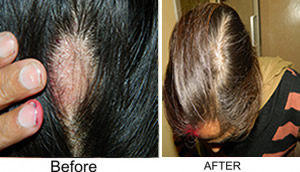Attention deficit hyperactive disorder is one of the most common neurodevelopmental disorders of childhood. It is usually first diagnosed in childhood and often lasts into adulthood. Children with A.D.H.D may have trouble paying attention, controlling impulsive behaviors (may act without thinking about what the result will be), or be overly active. Signs and Symptoms It is normal for children to have trouble focusing and behaving at one time or another. However, children with A.D.H.D do not just grow out of these behaviors. The symptoms continue and can cause difficulty at school, at home, or with friends.
A child with ADHD might have
- daydreaming
- forget or lose things a lot
- fidget or restlessness
- Become bored with a task after only a few minutes, unless doing something enjoyable
- talk too much
- make careless mistakes or take unnecessary risks Have trouble completing or turning in homework assignments, often losing things (e.g., pencils, toys, assignments) needed to complete tasks or activities
- have difficulty getting along with others
Types There are three different types of ADHD, depending on which types of symptoms are strongest in the individual:
Predominantly Inattentive Presentation
- It is hard for the individual to organize or finish a task, to pay attention to details, or to follow instructions or conversations.
- The person is easily distracted or forgets details of daily routines.
Predominantly Hyperactive-Impulsive Presentation:
- It is hard to sit still for long (e.g., for a meal or while doing homework).
- Smaller children may run, jump or climb constantly.
- The individual feels restless and has trouble with impulsivity.
- Someone who is impulsive may interrupt others a lot, grab things from people, or speak at inappropriate times.
- It is hard for the person to wait their turn or listen to directions. He is always in hurry
- A person with impulsiveness may have more accidents and injuries than others.
- The person fidgets and talks a lot.
Combined Presentation: Symptoms of the above two types are equally present in the person
Causes of A.D.H.D.
The cause(s) and risk factors for ADHD are unknown, but current research shows that genetics with environmental effect plays an important role. In addition to genetics, the other possible causes and risk factors are
- Brain injury
- Environmental exposures (e.g., lead)
- Alcohol and tobacco use during pregnancy
- Premature delivery
- Low birth weight
Treatments
- In most cases, ADHD is best treated with a combination of behavior therapy and homoeopathic medication. No single treatment is the answer for every child and good treatment plans will include close monitoring, follow-ups and any changes needed along the way.
- Constitutional Homoeopathic treatment is based on genetics and environmental effect both, therefore it is best to treat ADHD with homoeopathic medicine and behavioral therapy










Leave a reply